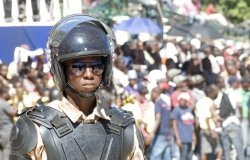<b>Cuba and Its Environs: The Challenges of Change </b>
Overview
Soon after its inauguration, the government of Raúl Castro announced several policy measures designed to inject flexibility into Cuba's revolutionary economic model and acknowledged systemic deficiencies that required rectification. This admission contrasted with the policy stances adopted by Fidel Castro's government, and hinted at a possible, albeit limited, opening of Cuba's economy as well as deeper engagement with the international community. Speculation about the meaning of these changes immediately centered on Cuba's bilateral relations with the United States, and especially on the longstanding U.S. economic embargo on the island. Yet changes in Cuban economic policies also potentially have a much more dramatic effect on its smaller Caribbean neighbors, many of which consider themselves competitors with Cuba on such issues as tourism, foreign investment, agricultural production, and energy resources.
To discuss this often overlooked aspect of Cuba's foreign affairs, the Latin American Program joined with the Caribbean Policy Research Institute (CaPRI), to convene the daylong conference "Cuba and its Neighbors: The Challenges of Change." The July 22, 2008, meeting was held at the University of the West Indies in Mona, Jamaica. The conference, part of the "Creating Community in the Americas" project, examined the changing landscape of Cuba's relations with its Caribbean neighbors, focusing on key aspects such as tourism and investment, bilateral cooperation, energy, and security. Panelists included a very diverse group of scholars and analysts from Jamaica, Trinidad, the United States, Colombia, and Canada. The conference also featured several key figures in Jamaican politics, most notably Prime Minister the Rt. Hon. Bruce Golding, Minister of Tourism Edmund Bartlett, and Commissioner of Police Hardley Lewin.
Prime Minister Golding characterized relations with Cuba as a window of opportunity for Jamaica, highlighting the historical character and multiple dimensions of the relationship. Noting Cuba's social achievements and its resilience in the face of the U.S. embargo, he acknowledged significant changes in Cuban leadership and policy-making, a process that countries in the region ought to support and encourage in a non-intrusive way. Minister of Tourism Bartlett elaborated on the recently-concluded partnership agreement between Cuba and Jamaica and how it will propel their respective tourism industries. He underscored that in an era of multiple challenges to the Caribbean's tourism industry (including global fuel prices, a sliding U.S. dollar, and competition from other destinations), regional cooperation through strategies like multiple destination marketing can help the Caribbean maintain a leading position in the industry. In his remarks on the state of security cooperation with Cuba, Commissioner Lewin described potential threats to Cuba from within the region, including terrorism, narco-terrorism, drug trafficking, and human trafficking. He also explained the role of the military in the evolution of contemporary notions of security in Cuba, and how Jamaica and Cuba have been developing cooperation to curtail drug and arms trafficking in the western Caribbean.
Panelists described how the Caribbean faces a set of complex challenges as Cuba moves toward further engagement with the global economy. Some of the challenges may include reduced cooperation in health services from Cuban doctors currently servicing Caribbean populations; a displacement of tourism should U.S. travel restrictions to Cuba be lifted; important oil and ethanol production capabilities on the island now being explored; and competition for regional foreign direct investment. Similarly, they also noted the potential for close regional cooperation, emphasizing that Caribbean expertise can serve as an important resource for Cubans in areas such as the development of alternative energies, tourism entrepreneurship, and food security.
Hosted By

Latin America Program
The Wilson Center’s prestigious Latin America Program provides non-partisan expertise to a broad community of decision makers in the United States and Latin America on critical policy issues facing the Hemisphere. The Program provides insightful and actionable research for policymakers, private sector leaders, journalists, and public intellectuals in the United States and Latin America. To bridge the gap between scholarship and policy action, it fosters new inquiry, sponsors high-level public and private meetings among multiple stakeholders, and explores policy options to improve outcomes for citizens throughout the Americas. Drawing on the Wilson Center’s strength as the nation’s key non-partisan policy forum, the Program serves as a trusted source of analysis and a vital point of contact between the worlds of scholarship and action. Read more
Thank you for your interest in this event. Please send any feedback or questions to our Events staff.










